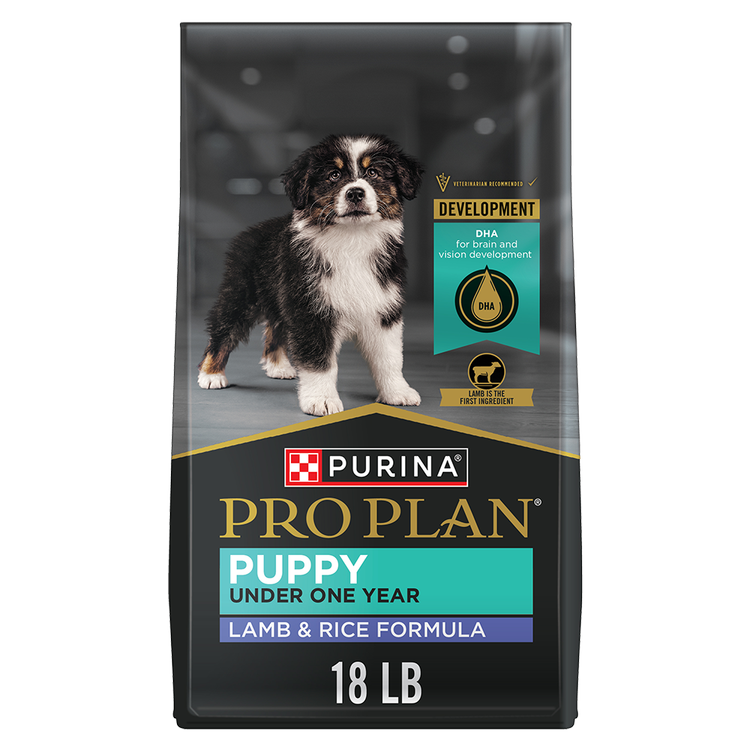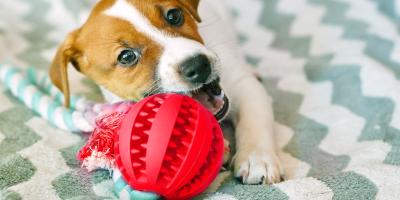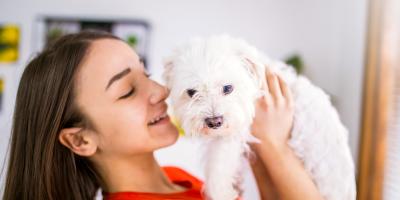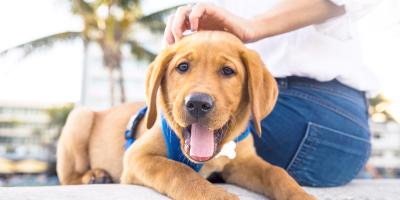Puppy Barking: Expert Tips for Managing Noisy Puppies


Managing excessive puppy barking and biting might be one of the most challenging hurdles when raising a puppy.
You’re losing sleep, your neighbors are starting to resent you, you feel guilty every time you leave your home, and getting any tasks done at home becomes a very tough task. Why? Your puppy won’t stop barking.
Our puppy care experts have the answers here. We provide expert tips and techniques for preventing excessive barking and managing noisy behavior.
When Do Puppies Start to Bark?
When dogs are around 8 weeks old, they are able to start building bonds with the humans around them, which is when they start to bark. And, oh my, do puppies go through a barking stage. At this point, they may begin to bark at you, starting their puppy barking phase by vocalizing, “Yip!”
When puppies start to bark, that’s when they start vocally communicating with you. That window of time is a crucial training period when the puppy begins human bonding, and learns which behaviors are and are not appropriate around their human companions. During this period, a puppy owner should start teaching their puppy boundaries and good manners.
Why Do Puppies Bark?
You might start wondering, Why is my puppy barking at other dogs? or Why is my puppy barking at me?
There could be many reasons why a puppy barks at everything. The puppy barking at cat silhouettes and the puppy barking at nothing could be barking for so many reasons. Your howling puppies might be barking in defense against someone or something scary, bark to get your attention, be bored or just bark to greet you.
Many ask, The puppy barks when I leave the room. Why? Why is this puppy growling and barking at me?
Many puppies also get separation anxiety. They have yet to learn how to cope with alone time, so they’re the puppy barking when left alone. The good news is that if you let your puppy know that they can make sure you’re trustworthy and teach your dog that it is OK to be alone at times through training and providing positive things to keep them occupied while you are away, you can curb the puppy separation anxiety barking.
Puppies also often yip while playing; and play is needed for healthy brain development.
How to Teach Your Puppy Not to Bark
Truthfully, only once you learn why your pup barks can you teach them when not to bark. Puppies barking and crying happen for many reasons, affecting their training. Here are a few types of barking and their solutions:
- Boredom: Add more play and toys to your puppy’s life
- Attention: Ignore this barking and train by positively rewarding quiet and calm behavior
- Alert: Minimize the opportunity for the puppy to feel alerted and then train for a positive replacement behavior
- Separation anxiety: Prioritize desensitization, crate training, heartbeat toys and safe spaces
- Play: Play with your puppy and take the game outside! Barking doesn’t have to stop there
- Fear: Remove the source of fear as quickly as possible, and then train and work to desensitize and counter-condition if the ‘fearful’ thing is a normal part of their everyday environment
- Reactive: Train your puppy, ideally with a professional
Also, for puppies with separation anxiety, puppy owners can incrementally train them to remain calm when they leave the house. Essentially, puppy owners can start by going for a few minutes, rewarding their puppy for not barking, and then slowly increasing the time out of the house. They can reward their puppy each time they are calm when the owner returns. Puppy owners shouldn’t reinforce their puppy being really revved up when they get home in case their puppy is anxious.
Here are some other good ways of setting up your puppy’s environment to help them not to bark:
- Reducing visual stimuli by covering windows, keeping curtains and shades down
- Masking outside stimuli by leaving friendly-sounding radio or TV on
- Leaving a chew toy with your scent on it next to the puppy
- Find ways to make that chew toy so delicious that it may make the puppy look forward to alone time
- Keep the puppy in the quietest part of the house until they are well-behaved
Ultimately, how you teach your puppy not to bark is just like how you teach your puppy not to bite, where you reward non-biting behavior. You’ll need to find ways to identify and reward positive behavior.
Dealing With Nighttime Barking
Is your puppy barking at night?
As many of today’s households have the stereo, TV or radio on all the time when people are at home, a puppy might get used to that noise and then go wild if, in the middle of the night, a possum makes a noise just outside the house, piercing through the usual noise. The puppy could wake the neighbors up with alarmed barking. Leaving the TV, stereo or radio on could be one solution to providing the comfort needed to stop that barking.
Crate training for puppies is another solution for nighttime barking. It’s a solution for most barking causes, particularly in helping comfort puppies going through separation anxiety. The puppy can be trained to use the crate to sleep quietly and not bark at night.
Puppy Barks in Crate at Night
You might still find your puppy barking in a crate because of:
- Unresolved separation anxiety
- Or they might just need to pee or poop
- Boredom
Should I Ignore Puppy Barking in Crate?
If you’re sure about the cause of the barking, the answer is yes, unless the reasons are the following:
- They need to use the bathroom
- Also, if your dog is really anxious in the crate, you shouldn’t leave them in there. The owner needs to make the crate more positive and work on lengthening durations while keeping the crate a positive place.
And then you may ask yourself, How long should I let my puppy bark in crate?
If you think the puppy is barking because of boredom or attention, then you only need to wait until the puppy is quiet for a few seconds before returning to it, rewarding it for being quiet and/or letting it out. You just don’t want to let it out or give it attention while it is actively barking. If you do, you will be reinforcing that barking, and the puppy is likely to continue.
How to Stop Your Puppy Barking for Attention
Dogs are social creatures, and most dogs respond to any attention they can receive.
For example, if you shout at your puppy when it barks, it may find it rewarding and prefer negative attention to none. Puppies may also bark for attention, knowing that whenever they bark, you will react and get them what they want.
If your puppy is barking for attention, this is known as ‘puppy demand barking,’ and to help teach puppy not to bark, you should ignore it. They’ll eventually stop barking for that reason. When, and only when, they stop barking can you acknowledge and reward them.
Excessive Barking Puppy Prevention
Preventing excessive barking involves identifying its sources and properly training your puppy.
We want our dogs to try to communicate with us. If something is alerting them, a bark or two is OK. Excessive barking is problematic.
Barking is not just about anxiety. To prevent puppy barking, you’ll need to identify the sources (regardless of the emotional state) and develop the training cues necessary to communicate when barking needs to stop.
It’s important to remember that training a puppy is often easier than training an older dog. Puppy brains are more malleable and receptive to new habits, and it’s also important to note that they have yet to have as much opportunity to establish unwanted behavior habits.
When is Puppy Barking Okay?
A puppy barking at people while playing is acceptable, as long as it’s not too loud for your environment because it’s a natural reaction. Puppies barking and playing, particularly among their litter, genuinely benefit their development.
Puppy barking is also welcome when alerting a concern, especially if that’s what the puppy was trained to do.
For more helpful training insights, check out the myPurina app.
For more expert tips on your puppy’s behavior, explore our other puppy behavior articles.
For your own personalized dog training plan, download Zigzag, the most advanced dog training app, for free and unlock 1 month of Premium Access with unlimited lessons, tailored guidance, and 24/7 expert support using code PUR30 at payment.
Install Zigzag for free now to get started

Be Rewarded for Your Purina Purchases
Earn and redeem points for Purina products with myPurina app.






